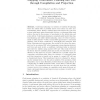Free Online Productivity Tools
i2Speak
i2Symbol
i2OCR
iTex2Img
iWeb2Print
iWeb2Shot
i2Type
iPdf2Split
iPdf2Merge
i2Bopomofo
i2Arabic
i2Style
i2Image
i2PDF
iLatex2Rtf
Sci2ools
117
click to vote
CAEPIA
2005
Springer
2005
Springer
Mapping Conformant Planning into SAT Through Compilation and Projection
Conformant planning is a variation of classical AI planning where the initial state is partially known and actions can have nondeterministic effects. While a classical plan must achieve the goal from a given initial state using deterministic actions, a conformant plan must achieve the goal in the presence of uncertainty in the initial state and action effects. Conformant planning is computationally harder than classical planning, and unlike classical planning, cannot be reduced polynomially to SAT (unless P = NP). Current SAT approaches to conformant planning, such as those considered by Giunchiglia and colleagues, thus follow a generate-and-test strategy: the models of the theory are generated one by one using a SAT solver (assuming a given planning horizon), and from each such model, a candidate conformant plan is extracted and tested for validity using another SAT call. This works well when the theory has few candidate plans and models, but otherwise is too inefficient. In this pa...
| Added | 26 Jun 2010 |
| Updated | 26 Jun 2010 |
| Type | Conference |
| Year | 2005 |
| Where | CAEPIA |
| Authors | Héctor Palacios, Hector Geffner |
Comments (0)

